#Pratchat87 Notes and Errata
These are the episode notes and errata for Pratchat episode 87, “Exclusive Possession: Ankh-Morpork Edition”, discussing Martin Wallace’s 2011 Discworld board game, Discworld: Ankh-Morpork, with guest Richard McKenzie.
Iconographic Evidence
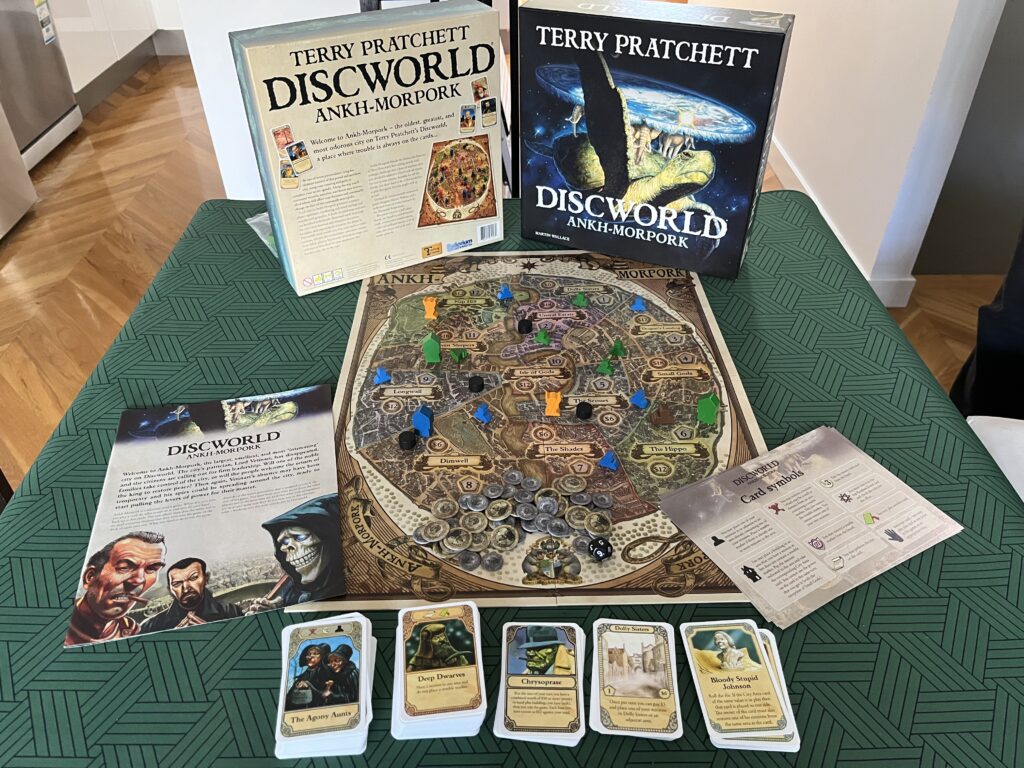
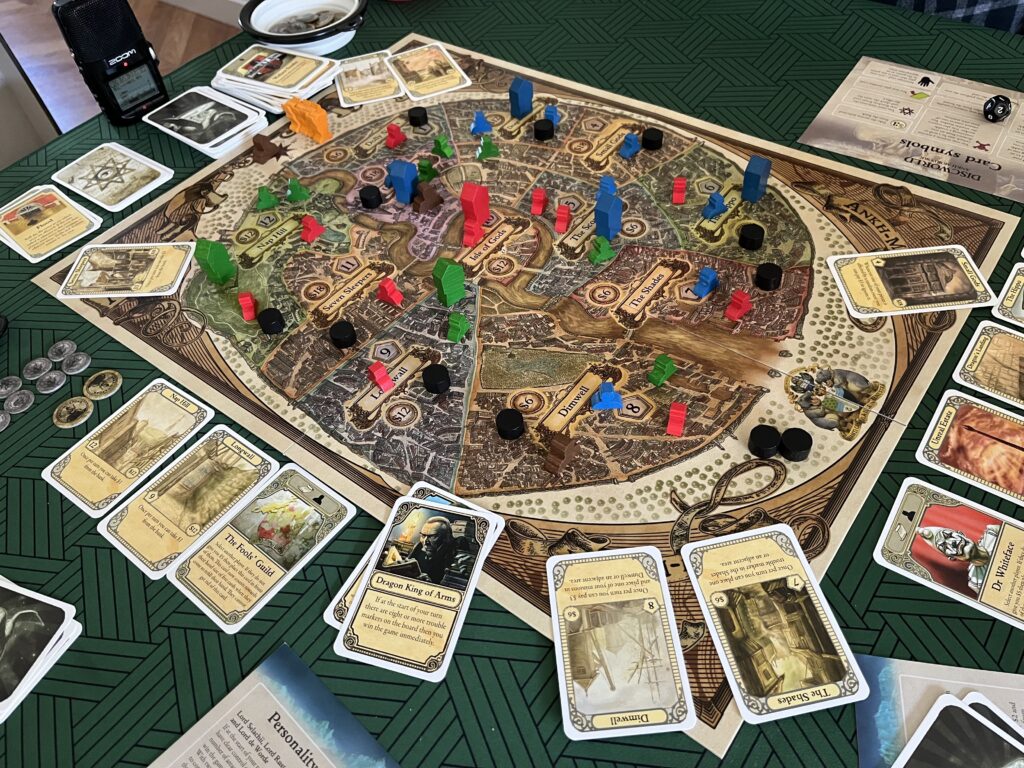
Below are all the specific cards we mentioned this episode; you can also find lots more photos of the game on its BoardGameGeek page.
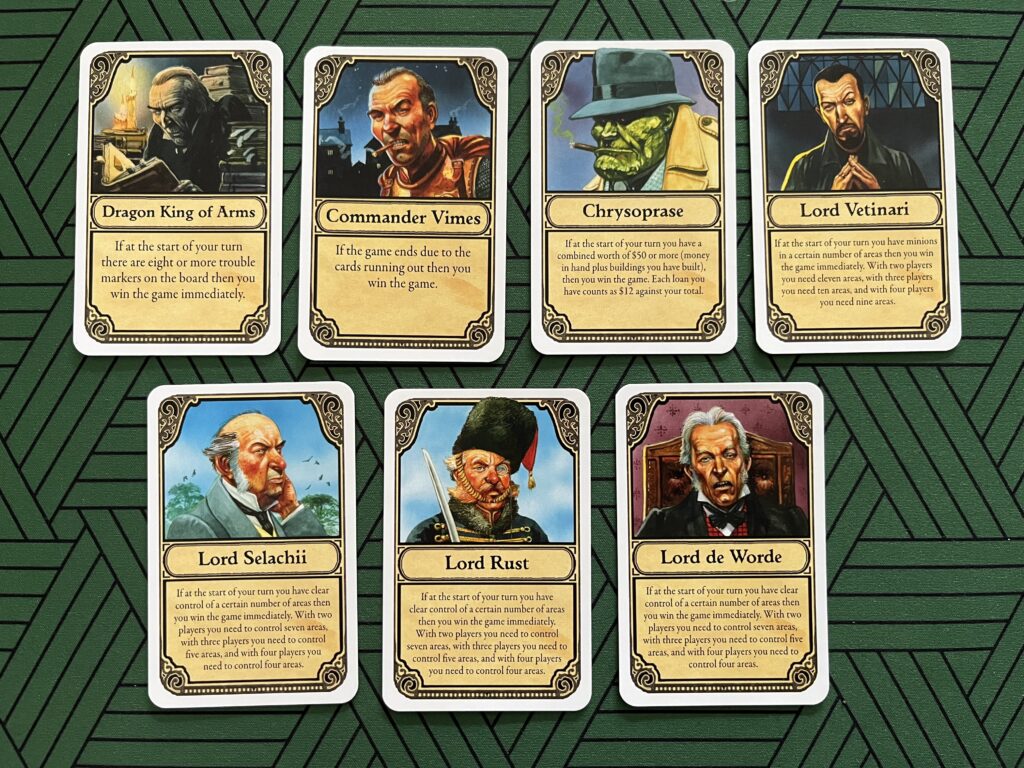
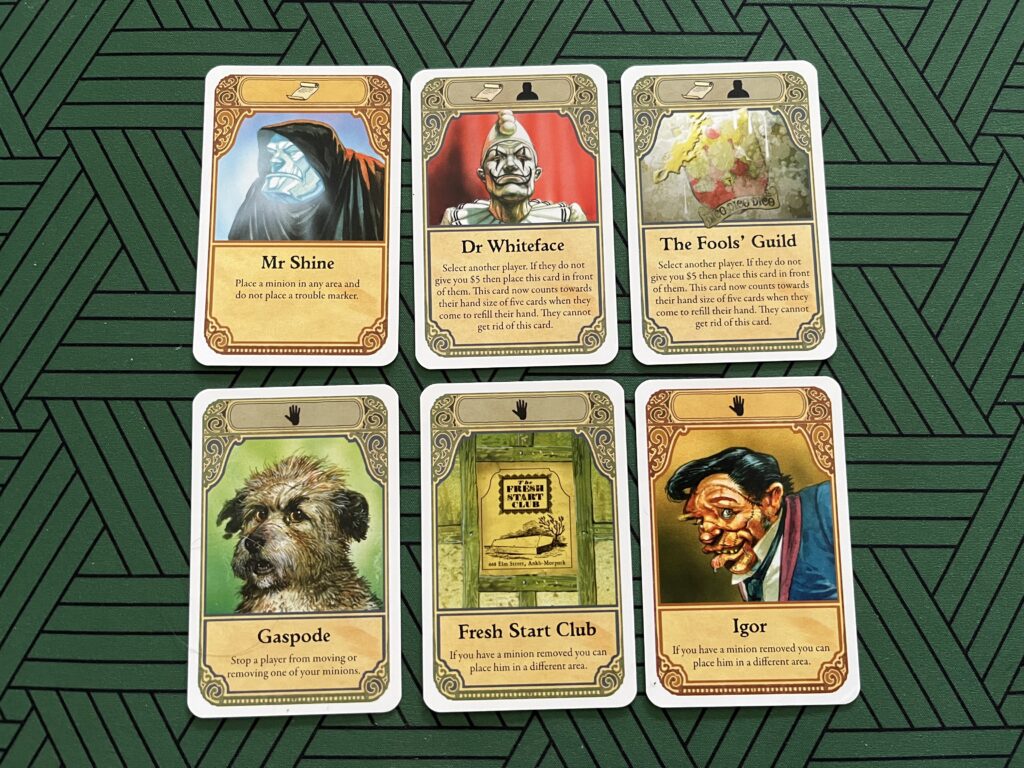
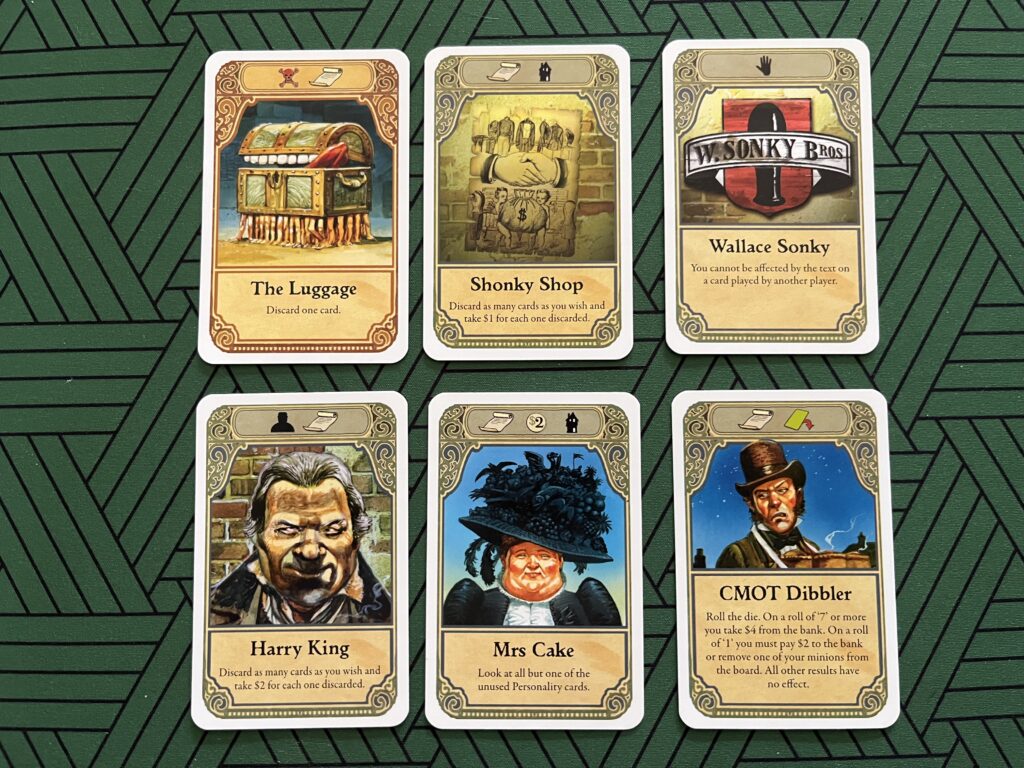
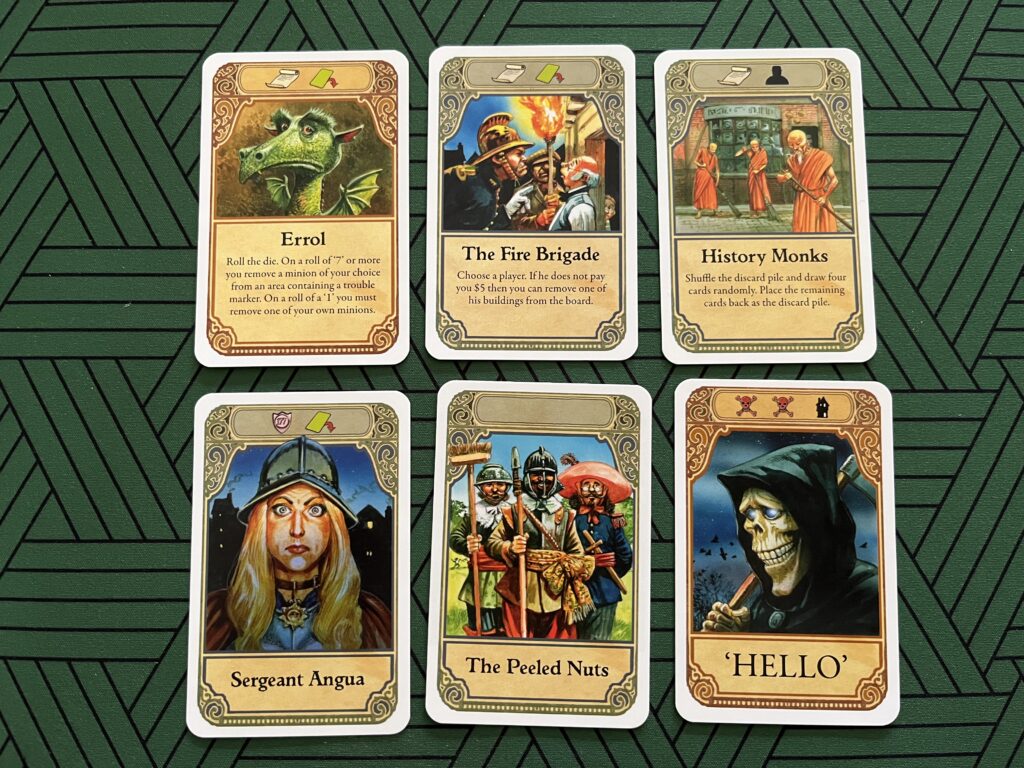
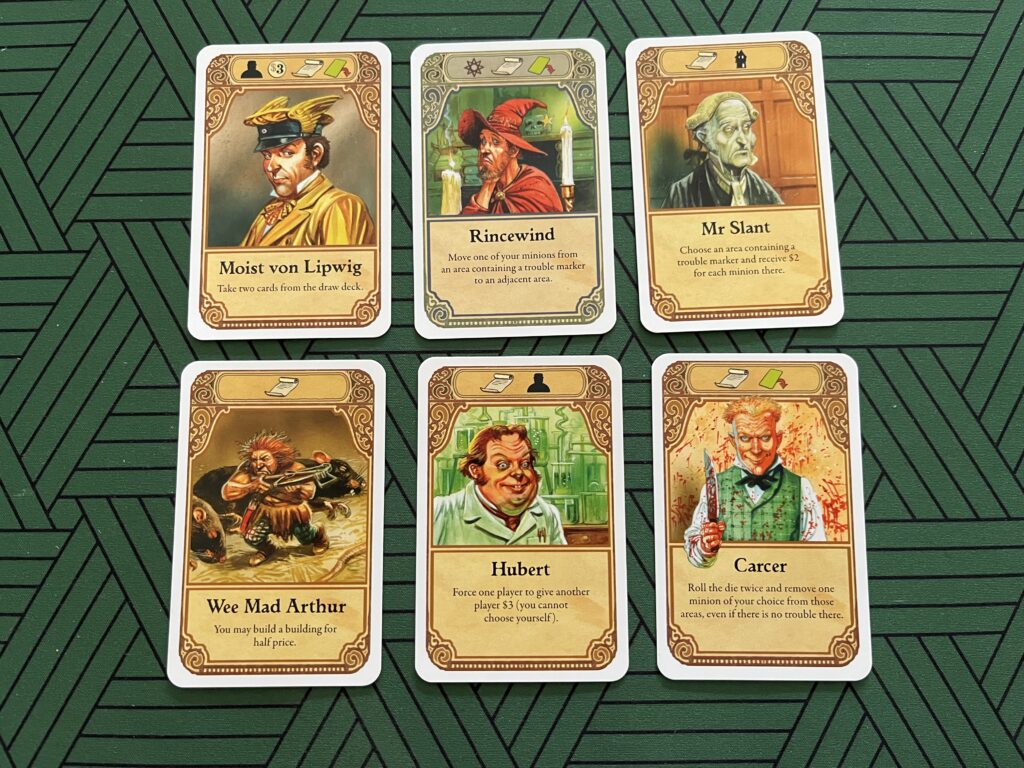
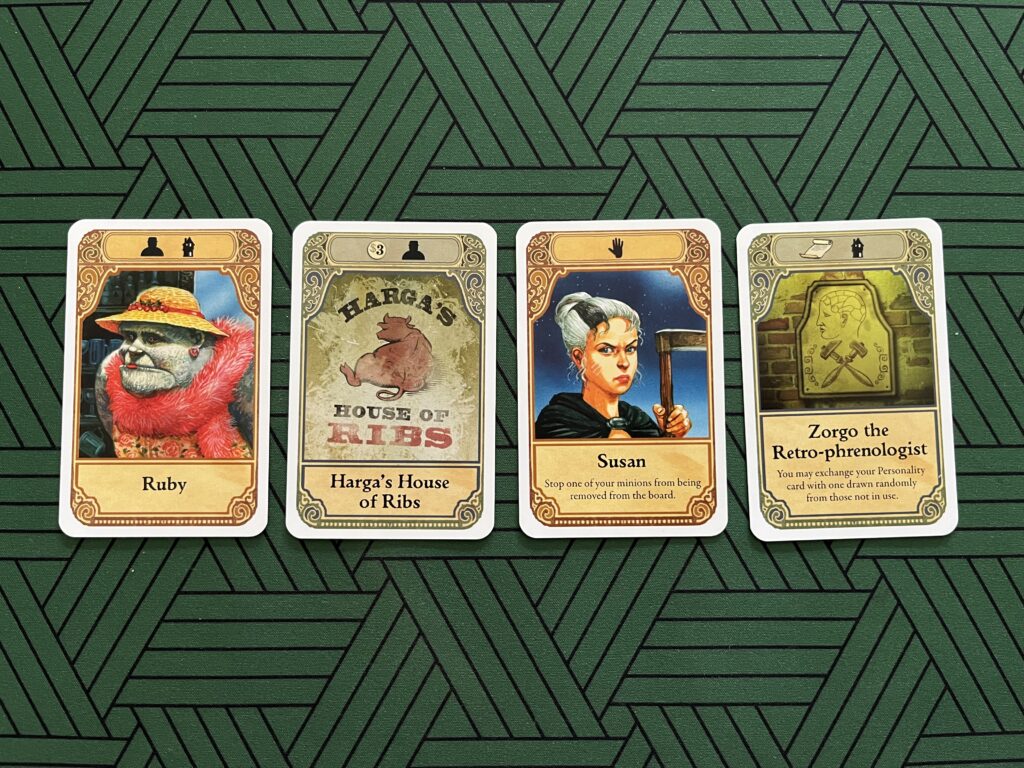
Notes and Errata
- The episode title refers to Exclusive Possession the suspiciously Monopoly-like game to which a dying person once challenged Death. Death briefly mentions this in Reaper Man. (He was the boot.)
- Richard previously appeared on #Pratchat5, “Ten Points to Viper House” discussing Pyramids, and #Pratchat40, “The King and the Hole of the King”, discussing The Fifth Elephant.
- We only mention them a little, but the other (official) Discworld board games are:
- Thud (2002, designed by Trevor Truran) – a Hafltafl-style game in which one side of pieces are dwarfs, and the other are trolls. As seen in the novel Thud!, though as mentioned the game pre-dates the book! Discussed in the bonus episode #PratchatPlaysThud, “The Troll’s Gambit” with guest Dr Melissa Rogerson.
- Guards! Guards! A Discworld Board Game (2011; designed by Leonard Boyd and David Brashaw) – players take on the role of various Guilds who recruit various Discworld characters to help track down the missing spells from the Octavo. We played it for #Pratchat75, “…And That Spells Trouble” with guest Dr Melissa Rogerson.
- The Witches (2013, designed by Martin Wallace) – a semi-cooperative game in which the players take on the role of Tiffany Aching and her fellow apprentice witches, solving problems around the Ramtops. We discussed it in #Pratchat67, “The Three-Elf Problem”, with guest Steve Lamattina.
- Clacks: A Discworld Board Game (2015; designed by Leonard Boyd and David Brashaw) – players are Clacks operators competing to send their messages the fastest – or collaborating to send a message before Moist von Lipwig can deliver it via horse… Discussed in #Pratchat82, “Clack Go the Gears”, with guests Nicholas J Johnson and Lawrence Leung.
- We mention a lot of other board games in this episode; some we have more to say about below, but here are most of them in a handy list with BoardGameGeek links and a brief description:
- Ticket to Ride (2004, designed by Alan R. Moon) – a popular gateway game still going strong after all these years. Players take turns to collect sets of coloured cards and play them to place trains on a map of the US (or various other countries in other editions), trying to complete routes between specific cities for points. It’s easy to learn and plays pretty fast, but if you’ve played a few board games already, you might like to consider some of the alternatives in this video from No Pun Included.
- Gloom (2005, designed by Keith Baker) – a storytelling card game in which you try to have the most miserable life in a very miserable family. It’s fun schtick is that the cards are transparent, and you layer them on top of each other. There’s also a Cthulhu version, and a handful of others, including one based on Game of Thrones.
- Big Trouble in Little China: The Game (2018, designed by Christopher Batarlis, Boris Polonsky and Jim Samartino) – a miniatures-based game, adapted from John Carpenter’s 1986 action-comedy movie starring Kurt Russell, Kim Cattrall and James Hong. Up to four players take on the roles of characters from the film to collaboratively defeat the sorcerer Lo Pan, who is trying to lift a curse so he can return to his evil ways. We think Richard might have found an actual playthrough video, though; this how to play video is only 12 minutes long!
- Magic: The Gathering (1993, designed by Richard Garfield) – the first and still the most successful collectible card game, or trading card game. Buy packs of random cards and build a deck consisting of lands which give you points of “mana” in one of five colours, and spells that spend that mana to summon creatures and otherwise attack your opponent.
- Talisman (1983, designed by Robert Harris) – originally published by Games Workshop, this game sort of resembles fantasy Monopoly. Players roll dice to move one of many different characters around a board to land on spaces where something good or bad might happen to them as they seek the “Crown of Command” to win the game. There are several “levels” to move through, and as Richard mentions, lots of expansions which add even more.
- Blood on the Clocktower (2022, designed by Steven Medway) – a modern social deduction game – essentially a much more sophisticated version of Werewolf. Players live in a village struck down by a curse of some kind; everyone has a unique role, and tries to figure out which of them is possessed by a murderous demon – or conceal the demon, to further their own evil plans. The game comes with multiple scenarios and a large number of unique roles, and players are able to continue influencing the game even if their character is killed.
- Pandemic (2008) – we mention this every board game episode, because it’s one of Ben’s favourites. Collaboratively try to collect samples to cure four rampant diseases before they overwhelm the world. The game’s mechanisms have been adapted to everything from Cthulhu to World of Warcraft, Star Wars, Ancient Rome and most recently Lord of the Rings. Designed by Matt Leacock, whose other similar games include Thunderbirds, the Forbidden series, and the “solve climate change” game Daybreak, co-designed with Matteo Menapace.
- Mythos (1996, designed by Charlie Krank) – another collectible card game from the 1990s, Mythos was a Cthulhu-themed game in which you scored points by telling stories about your investigator’s adventures. Ben still has a bunch of cards and is hoping to play it again soon.
- Oath (2021, designed by Cole Wehrle) – beautiful and colourful, Oath is more or less a wargame about the fight over the throne in a fantasy kingdom. It’s often bigged up for creating interesting stories, but Ben has found it wanting in that department. He’s willing to give it another go, though – not least because it was very expensive. The Discworld fan conversion Ben mentioned is by BGG user dugbride, and basically transforms every card in the game into a Discworld equivalent. Heads up that it uses entirely AI-generated art.
- Cluedo (1949) – an old-school deduction game in which players move around a map of a mansion gathering cards representing clues to a murder. By slowly figuring out which person, weapon and location are missing from the deck, they race to be the first to put the solution together. The original American name is Clue, but the name more familiar to the rest of the world is a pun on “clue” and “Ludo”. Like Monopoly, it’s been released in many themed versions, though it’s usually modified a little more than Monopoly. A lot of the themes have been TV shows, like Brooklyn-99, Miss Fisher’s Murder Mysteries, Doctor Who and Bob’s Burgers. (In more family friendly versions, the crime is no longer a murder.)
- The board game video by Aunty Donna is “Explaining a Board Game” from April 2020.
- There are three editions of Discworld: Ankh-Morpork, and you can find photos of all three on BoardGameGeek:
- The standard edition, the one Ben owns and the one you’ll most likely find secondhand, comes in a standard square-shaped box the same size as Ticket to Ride. It has a painting of Great A’Tuin on the cover (which we think is the art by Paul Kidby). This has the regular wooden pieces seen in our photos, with cardboard coins. It was published by Treefrog Games and Esdevium in the UK, Mayfair Games in the US, KOSMOS in Germany, Phalanx Games in Poland, and a few others in other European countries.
- The Collector’s Edition comes in a rectangular box with alternate art of a dragon flying over Ankh-Morpork by the game’s main artist Peter Dennis. This version includes wooden coins, a custom d12 with “no eight”, a larger board, and a poster of Peter Dennis’ card designs.
- The Deluxe Edition is the same as the Collector’s Edition except that it replaces the minions, buildings, trolls and demons with resin miniatures. Ben particularly likes the demons in this version, which better match the Things from the Dungeon Dimensions in the books than the wooden horned demon tokens.
- The Ankh-Morpork map on the board seems to be based on The Streets of Ankh-Morpork by Steven Player, the first official published map of the city. It lines up pretty well with that version of the city, though there are likely a few more differences with the later Compleat Ankh-Morpork. Note that some fan sources treat the board game map as canonical, including using the names of the areas as names for neighbourhoods or suburbs of the city. While most are drawn from the books, some seem to be an invention for game purposes.
- The part of the kidney that Liz thought Ankh-Morpork resembled is the glomerulus.
- The card that lets you add a minion without adding trouble is Mr Shine.
- “Mulligan” is a term used in games for when a player is allowed to have another go at something to keep the game competitive and fun. It may have originated in golf, or possibly baseball, and dates back to at least the 1930s, though its exact origins are unknown. A mulligan in golf is only for casual play, but is where a golfer is allowed to take a shot again from the same position when they lose their ball. Another well-known use is in Magic: The Gathering, where it is an official rule that a player can choose to take a “mulligan” and re-draw their initial hand of cards for the game, albeit with an increasing penalty for multiple mulligans in most most formats of the game.
- As far as we know, there has never been a Discworld: Ankh-Morpork tournament. An opportunity for a future Discworld convention, perhaps?
- Nanty Narking (2019) is the “re-implementation” of Discworld: Ankh-Morpork plublished by PHALANX. Re-implementation is board game jargon for re-using the same (or significantly similar) rules with a new theme or narrative – in this case, fictional Victorian London. As Ben mentions in the footnote, the main rules changes are a tweak to the Chrysoprase personality card, and some alternate rules for more advanced play. That includes the alternate personalities Ben mentioned – and you can find Ankh-Morpork versions of those on BoardGameGeek – but also an “Agent & Buildings” variant which introduces two additional sets of cards. Players are dealt three Agent cards and one Building card at the start of the game; these are initially hidden, and provide specific additional powers which interact with the player’s Agents (equivalent to Ankh-Morpork’s Minions) or Buildings on the board.
- The Cthulhu expansion for Nanty Narking is titled Nanty Narking: The Rise of Cthulhu, and was funded by a successful campaign on GameFound (a crowdfunding platform specifically for games) in February 2025, raising over €200,000. As of July 2025, you can still join the campaign via a “late pledge” to get discounted copies of the expansion and a new printing of the base game, as well as some other bits exclusive to the campaign. The expansion adds a lot: players can now play as “Great Old Ones” attempting to take over London, using giant miniatures, powerful “Elder Ones” who are like Agents (the game’s version of minions) but with special powers, and many additions to existing elements of the game. It seems to evoke similar themes to Wallace’s 2024 Cthulhu in Victorian London game, Cthulhu: Dark Providence by CMON Games, part of their Cthulhu: Death May Die game setting. (This is itself a re-implementation of Wallace’s 2013 game A Study in Emerald, based loosely on the short story by Neil Gaiman.)
- We’re pretty loose with the game’s terminology. We don’t recommend anyone learn to play from our description, but we thought we’d clarify a few game terms and rules:
- The board is divided into twelve “City Areas”, each representing a district or neighbourhood, like The Shades, Dolly Sisters, the Unreal Estate or The Scours. Each has a corresponding City Area Card (the game is very good at naming things plainly), which gives a player a specific benefit: usually a simple ability they can use once per turn, like gaining $2. A City Area Card is claimed when a player builds a building in the corresponding area (not by controlling an area as we repeatedly say; see below), and only one building can be in each City Area. In the (relatively rare) event that a building is destroyed, the player loses the corresponding City Area Card.
- A player controls a City Area by having more pieces (minions or buildings) in the area than any other single player. This has no special effect aside from helping to satisfy the win condition of the three Lord personalities.
- Ben refers to Rincewind’s power to draw a “special ability”, but what he means is the Random Event cards that include (among other things) a riot, a dragon attack, or adding trolls or demons to the board. All wizards have the octogram symbol that requires a player to draw a Random Event; this is the only action that is not optional. These are quite rare in the first half of the game.
- The Discworld train game was shared with us by subscriber Lachlan, who’s a big fan of train games. The game in question is an “18xx” game – part of a family of games which all draw inspiration from the 1970s game 1829 designed by Francis Tresham. Each game has its own quirks, and there are two main “lineages” which take the form in different directions; many of them take a long time to play. A major theme of these games is that players don’t have their own train company; but instead are buying stock (i.e. shares, not train stock) in private train companies, which become active when they receive enough investment. The player with the most stock in a company then gets to spend the company’s money and choose how it operates, hoping to make money and then decided what to do with its profits, affecting its stock price. BoardGameGeek lists nearly 300 18xx games, some which adapt the rules to other themes, and there are many more fan-made games as well. The one Lachlan brought to our attention is called “18DW” or “18Discworld”; it was based heavily on Raising Steam, and includes one major company, forty-seven private companies and “attacks by fundamentalist dwarves”, among other things. The only evidence of the game is a photo on a BoardGameGeek list of 18XX expansions in progress (it’s #124 in that list), and an online auction listing for a seemingly finished version of the game that lists the designer’s name as Christopher Bird. Perhaps this was the only copy? As an unlicensed fan game, its unlikely to ever fully see the light of day, but its nice to know someone out there has a copy. (Sorry it’s not you Lachlan!)
- There are indeed fan expansions and variants of Discworld: Ankh-Morpork, as well as fan recreations of the game to deal with the fact that it’s long out of print! Most add additional personalities, player cards and event cards, though some also add new pieces as well. You can find discussions of a bunch of these – including the Discworld adaptations of the variant personalities from Nanty Narking – in the game’s Variants forum on BoardGameGeek.
- We’ve previously discussed the history of Monopoly and its origins as The Landlord’s Game in #Pratchat59, “Charlie and the Whale Factory”. The 99% Invisible podcast has a good overview of this history in episode 189, “The Landlord’s Game“. The website landlords-game.com has lots of info about the multiple versions of Elizabeth Magie’s original game, and has brought one of them back into print!
- Not only is Elton John Monopoly real, but it’s recent – released in March 2025, and available via Elton John’s official merch store. It renames (but doesn’t remodel) the houses and hotels as stands and stadiums, and replaces the traditional playing pieces with iconic pieces of Elton’s headgear.
- You can find Thinker Themer on YouTube. They’ve made a lot of videos, but currently are focussing on their “Shelfworthy?” series of reviews. If you like their channel, you can support them by buying their merch – their logo is super cool!
- Armello (2015) is a digital board game from Melbourne developers League of Geeks. As described by Richard, it has a fairytale talking animals theme in which the old king (a lion) is paranoid and dying after a corruption has taken hold of the land. Players take on the role of various animals vying to be the next monarch, though means fair or foul. Armello is available on Windows, macOS, Linux, iOS, XBox One, PlayStation 4, Nintendo Switch and Android. It remains a reasonably popular multiplayer game, and in its final update in 2022, added crossplay, supporting multiplayer between different platforms. A tabletop version of the game, designed by Rob Heinsoo, was crowdfunded in 2024 and is expected to be published in 2025 by Australian company King of the Castle Games.
More notes coming soon!
Thanks for reading our notes! If we missed anything, or you have questions, please let us know.
